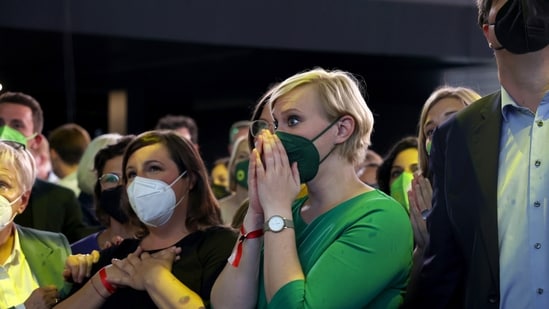German elections: Projections show polls are too close to call
Projections suggest German election is too close to call
The center-left Social Democrats lead the conservative CDU/CSU bloc by 0.2%, according to initial projected results. In such a tight race, the possibilities for a coalition are still unclear.

The first projected results are in for Germany's 2021 federal election, with the the center-left Social Democrats (SPD) on 24.9%, narrowly ahead of the center-right Christian Democrats and their Bavarian sister party (CDU/CSU) on 24.7%. However, the conservatives are projected to win one more seat than the SPD.
The environmentalist Greens were in third position on 14.8%. The far-right Alternative for Germany (AfD) were on 11.3%, just ahead of the pro-business Free Democrats (FDP) on 11.2%. The socialist Left party is on 5%.
The projections suggest the center-left parties were the biggest winners of the election. The SPD gained 4.5% compared to their result in the last federal election in 2017, while the Greens were up over 6%.
The conservative bloc suffered heavy losses as the Angela Merkel era comes to an end. They were down by almost 8% on the previous election and are heading towards their worst result since 1949.
What this means
In such a tight race, coalition possibilities remain unclear.
According to these projections, one option is a continuation of the "grand coalition" of the conservative CDU/CSU bloc and the SPD that has ruled Germany since 2013.
Other options could see a three-way coalition between the CDU/CSU, the Greens and the FDP.
Alternatively, the SPD could also seek to partner up with the Greens and the FDP.
The election of Germany's new chancellor by the Bundestag won't take place until a governing coalition has been formed. This could take months.
In the meantime, Angela Merkel will remain in office in a caretaker role.
What the parties are saying
The general secretary of the Social Democrats, Lars Klingbeil, says his party "is back again" following the release of exit polls that put the SPD in a dead heat with Merkel's conservatives.
"The SPD has the mandate to govern," he told public broadcaster ZDF. "We want [SPD chancellor candidate] Olaf Scholz to be chancellor."
CDU chancellor candidate Armin Laschet said the conservative bloc would do "everything we can" to form a new government, despite the election setback.
Greens federal political director Michael Kellner, meanwhile, expressed disappointment for his party's performance.
"We have clearly made gains," he told ZDF. "But it is difficult for me to be really happy about this increase."
He congratulated the SPD "on a great electoral success" and called the CDU's performance "historically bad."
How does the election work?
The German electoral system produces coalition governments. It seeks to unite the principles of majority rule and proportional representation. Each voter casts two ballots. The first is for what is called a "direct" candidate from their constituency and the second is for a political party.
Any party that gets more than 5% of the votes is guaranteed a place in the lower house of parliament, the Bundestag. This ensures that both big and small parties are represented, but has led to the legislature becoming the second-biggest in the world with a possible 900 seats this time around.
The reason is Germany's complicated electoral law, and the mandates for the "overhang" seats (Überhangmandate) and compensation "leveling" seats (Ausgleichsmandate) that assure the composition of the Bundestag will be proportionate to the actual votes for the parties.
How long will it take to form a coalition?
The process of forming could take weeks, or even months.
Coalition negotiations in 2017 were the longest in German history, leaving the country without a government for almost six months. This is because the FDP walked out of talks between the CDU and the Green party after a month of negotiations. For the last eight years, the two biggest parties, the CDU and the SPD, have governed together with Angela Merkel as chancellor.
It remains to be seen if the process will go quicker this time — especially if the political priorities of the partners are more closely aligned.
How is the chancellor chosen?
The parties put forward their candidate ahead of the election campaign. Once a new government is in place, the German president nominates a chancellor to be elected by the Bundestag. This is typically the main candidate from the senior coalition partner in the newly-formed government.
To be elected, the chancellor candidate needs an absolute majority from lawmakers. So far, all chancellors, including Merkel, have been elected in the first round.
Can an election be contested?
In Germany, any eligible voter can contest elections. They must send a written formal objection to the election review commission with the Bundestag in Berlin within two months of election day.
This commission processes all submissions. A decision is made on each individual challenge, and each objector receives feedback from the Bundestag. The entire procedure can take up to one year.
To invalidate the results of a Bundestag election, an objection must meet two requirements. Firstly, there must be an electoral error that violates the Federal Election Act, the Federal Election Code, or the Constitution. Secondly, the reported electoral error would have to have an impact on the distribution of seats in the Bundestag.
Objectors can also contest the findings of the election review commission and go all the way to the Federal Constitutional Court.
A German national vote has never been declared invalid.



